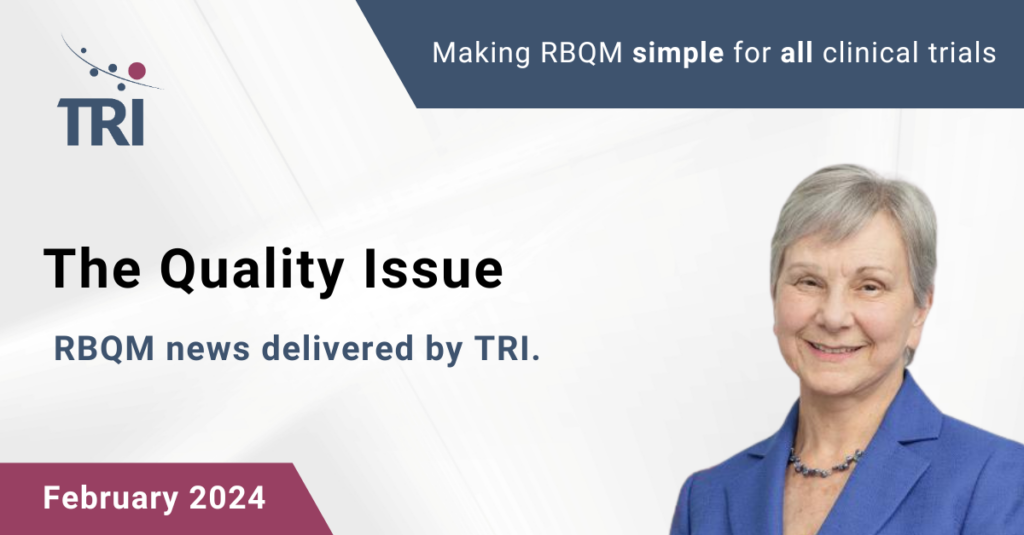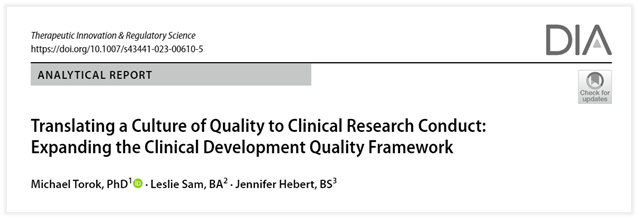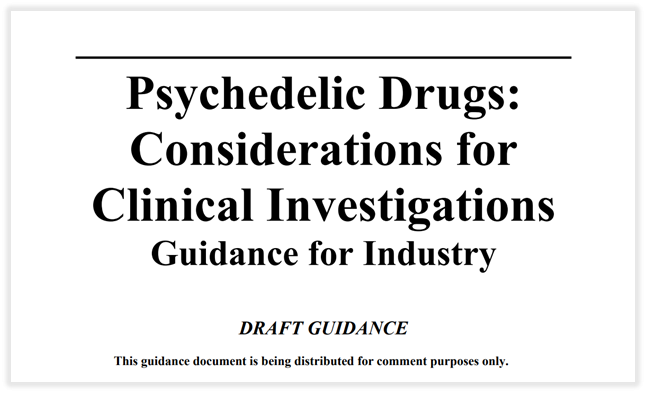The Quality Issue – February 2024

This issue starts on a note of appreciation: We celebrate Dr. Janet Woodcock’s remarkable legacy as she retires from the FDA, a journey that began in 1986. Dr. Woodcock’s pioneering introduction of risk management redefined drug safety, emphasizing a balance between benefits and risks. Her leadership has modernized drug approval and safety standards, notably through initiatives like the Pharmaceutical Quality for the 21st Century and the Critical Path Initiative. As we bid Dr. Woodcock farewell, we highlight her visionary approach to drug safety, which has left an enduring impact on public health and the pharmaceutical industry.
Also in this edition
We present a carefully curated list of the newest RBQM resources. Alongside that, we bring you key takeaways from recent conversations in the field. These insights and tools are tailored to equip you and your teams with the knowledge and strategies essential for confidently tackling the complexities of quality management.

Translating a Culture of Quality to Clinical Research Conduct: Expanding the Clinical Development Quality Framework
Authored by Michael Torok, Ph.D. ,VP and Global Head of Quality Assurance Programs at Roche/Genentech , Leslie Sam, President of Leslie Sam and Associates, and Jennifer Hebert, Principal Quality Lead at Genentech, the paper titled “Translating a Culture of Quality to Clinical Research Conduct: Expanding the Clinical Development Quality Framework” offers an in-depth exploration into building a Culture of Quality in clinical research, as advocated by the International Council on Harmonisation’s E8 Guidance Revision 1 (ICH E8(R1)).
This paper not only dissects the vital components that fuel critical thinking and foster an open, proactive dialogue essential for quality but also introduces maturity models to help visualize and assess the culture of quality within your organization. By providing examples of high-performing quality cultures and practical tools for assessment and evolution, this paper serves as an invaluable guide for clinical sites, sponsors, and service providers aiming to elevate their quality frameworks and practices. Read the paper

The Renovation of Good Clinical Practice: A Framework for Key Components of ICH E8
Another vital addition to our RBQM resource list is the paper, ‘The Renovation of Good Clinical Practice: A Framework for Key Components of ICH E8’. This paper by Madeleine Whitehead, Melissa S., Tashan Mistree, Margaret Mary Kearns, Gerard Marini, Christine Goffe, Marion Pillwein, and Vimi Shukkoor illuminates the ICH’s significant update to GCP guidelines. Emphasizing a shift from uniform approaches to a more flexible, risk-based methodology, this publication is crucial for understanding the nuanced changes in areas such as Quality by Design, Critical to Quality, Fit for Purpose, and Stakeholder Engagement. Derived from direct feedback from TransCelerate BioPharma Inc. member companies, it provides a fresh perspective on adapting these core principles within the evolving framework of clinical research. This piece is essential reading for professionals seeking to master the contemporary dynamics of RBQM in clinical trials. Read the paper

Building Quality into the Design and Conduct of Clinical Studies: Integrating QbD and RBM Approaches [FDA and Duke Margolis Center for Health Policy Event]
In our continuous effort to bring the latest advancements and discussions in clinical trial modernization to our readers, we are thrilled to highlight the recent public workshop that took place on January 31st. This pivotal event, convened by the Duke Margolis Institute for Health Policy in collaboration with the FDA, based around the vital themes of Quality by Design (QbD) and Risk-Based Monitoring (RBM). These methodologies are at the forefront of enhancing clinical trial efficiency, ensuring robust data integrity, and maintaining participant safety, all without compromising the core objectives of clinical research.
The workshop provided an invaluable platform for the clinical trials community to delve into the practical challenges and successes associated with integrating QbD and RBM into clinical study designs. It aimed to foster the incorporation of QbD principles in study protocols, identify barriers to the widespread adoption of QbD and RBM, and share best practices for their implementation, especially in light of the adjustments required by the COVID-19 pandemic.
For those who missed this enlightening event or wish to revisit the discussions, we are pleased to share that the recordings and presentations from the workshop are now available.
Stay tuned for an executive summary of the workshop in our next newsletter, which will distill the key takeaways and actionable insights from the event. This summary will serve as a guide for integrating QbD and RBM principles into your clinical research practices, aligning with the FDA’s current stance on these methodologies.

Advancing Psychedelic Clinical Study Design
Last month’s virtual public workshop, “Advancing Psychedelic Clinical Study Design,” co-hosted by the FDA and the Reagan-Udall Foundation for the FDA, marked a significant milestone in the exploration of psychedelic drugs in clinical trials and drug development. This event, aimed at addressing the unique challenges and considerations in psychedelic research, brought together a diverse group of experts from the research community, regulated industry, and beyond. The discussions centered around FDA’s draft guidance issued in June 2023, “Psychedelic Drugs: Considerations for Clinical Investigations,” which provides crucial insights for sponsors navigating the complexities of psychedelic drug development for various medical conditions.
The workshop delved into the intricacies of clinical trial design for psychedelics, including the critical aspect of RBQM and patient monitoring. For those working with or interested in psychedelic drug research, the PDF presentations from this workshop are an invaluable resource. We highly encourage sponsors and stakeholders in this field to review these materials to gain a deeper understanding of the current landscape, challenges, and innovative approaches in psychedelic clinical trials.
Upcoming Events
COG London
February 20-21, 2024, London
Join Team TRI at the upcoming the Pharmaceutical Business Conference Group#COG UK event in London, where we are excited to not only exhibit but also present our insights on operationalizing RBQM. Dive deep into the practical aspects of RBQM with us and discover how to seamlessly integrate risk management into your clinical operations. Plus, don’t miss the chance to meet our team in person at Booth #6. We’re looking forward to connecting with you, answering your questions, and sharing some free swag – including refreshing mints and custom lanyards. Make sure to stop by to grab yours and chat about how we can support your RBQM journey.
Joint US FDA – Health Canada and ICH Public Meeting
February 22, 2024
Co-hosted by the FDA and Health Canada, the purpose of this webinar is to inform stakeholders and gather valuable input in preparation for the upcoming ICH Biannual Assembly on June 4-5, 2024. This session will spotlight significant milestones in Good Clinical Practice (GCP) guidance and other key ICH guidelines. It’s an invaluable opportunity for industry professionals to contribute to shaping the future of research standards. Don’t miss this chance to engage with experts and have your voice heard in the lead-up to a major event in the pharmaceutical regulatory calendar.
Like, Share, and Comment
As we conclude this issue, we encourage our readers to share this newsletter with their networks. And for those eager to stay ahead and keep their finger on the pulse of the latest developments, we invite you to follow TRI – The RBQM Experts on LinkedIn. By following us, you will receive timely updates and engaging content in between our regular newsletter publication, ensuring you remain at the forefront of our ever-evolving field.
